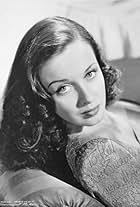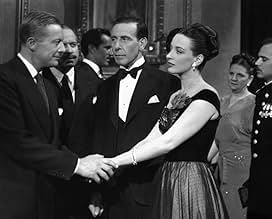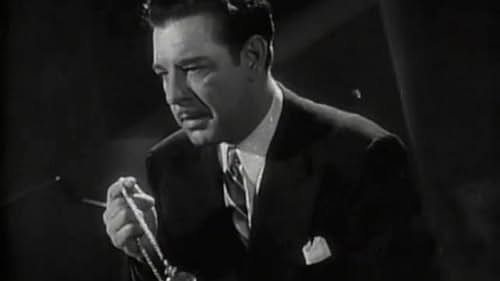Patricia Morison(1915-2018)
- Actress
- Soundtrack
Woefully misused while in her prime screen years at Paramount during the late '30s and '40s, Patricia Morison, lovely and exotic with Rapunzel-like long, dark hair, nevertheless became a star in her own right -- as a supremely talented diva on the singing stage.
Born on March 19, 1915, in New York City, her father, William Morison, was a playwright and occasional actor who billed himself under the name Norman Rainey. Patricia's mother worked for British Intelligence during WWI. Graduating from Washington Irving High School in New York, Patricia studied at the Art Students League and proceeded to take acting classes at the Neighborhood Playhouse while also studying dance with the renowned Martha Graham. She earned a steady check at the time as a dress shop designer.
At age 19 Patricia made her Broadway debut in the short-lived play "Growing Pains" and proceeded to understudy the legendary Helen Hayes in her classic role of "Victoria Regina". She never went on. In 1938, shortly after opening in the musical "The Two Bouquets" opposite musical star Alfred Drake, Paramount talent scouts, looking for exotic, dark-haired glamour types then to rein in their star commodity, Dorothy Lamour, scoped Patricia out and tested her. The blue-eyed beauty who indeed resembled Lamour was signed and made her film debut the following year, showing bright promise in the "B" film Persons in Hiding (1939).
Patricia's stock did not improve, however, despite such promise, and she was relegated to such second-string westerns as I'm from Missouri (1939), Rangers of Fortune (1940), Romance of the Rio Grande (1940), and The Round Up (1941). When things didn't improve with such stilted fare as Night in New Orleans (1942), Beyond the Blue Horizon (1942), and Are Husbands Necessary? (1942), she left Paramount. She freelanced in 'other woman' roles which included the Tracy/Hepburn vehicle Without Love (1945) and The Fallen Sparrow (1943), and played Empress Eugenie in The Song of Bernadette (1943), but the focus was seldom on her. Overlooked when cast in top leads at 'poverty row' programmers, her best chance at film stardom came as Victor Mature's despairing wife who takes her own life (which was to have been shown on screen) in Kiss of Death (1947), but her juicy role was excised from the film by producers (or, more likely, the Breen Commission) who felt audiences weren't ready for such shocking displays.
During the war years, Patricia had trained her voice and performed in USO tours. Cole Porter heard her sing in Hollywood one evening and decided she had the right tenacity, feistiness and vocal expertise to play the female lead in his new show. In 1948, over the objections of both the producer and director, stardom was clenched in the form of Porter's classic musical-within-a-musical "Kiss Me Kate." As the sweeping, vixenish Lilli Vanessi, a severe-looking stage diva whose own volatile personality coincided with that of her onstage role (Kate from "The Taming of the Shrew"), Patricia found THE role of her career, giving over 1,000 performances in all. Playing again alongside her former Broadway co-star Alfred Drake, Patricia basked in the multitude of glowing reviews, and such songs as "I Hate Men," "Wunderbar" and "So In Love" rightfully became signature songs. Following this triumph, film work never became a top priority again.
Patricia continued on successfully in the London version of "Kate" and went on to conquer other classic leads in the musicals "The King and I," "Kismet," "The Merry Widow," "Song of Norway" and Pal Joey," among others. Her last movie role was a cameo part as writer George Sand in the mildly received biopic Song Without End (1960) starring Dirk Bogarde as composer Franz Liszt.
On TV Patricia recreated her Kate role with Mr. Drake and made a few scattered but lively appearances over the years. One of her later guest shots was on a 1989 episode of "Cheers" and a 1991 episode of "Gabriel's Fire." In later years the never-married actress devoted herself to painting (an early passion) and enjoyed many showings in the Los Angeles area. The lovely lady with the trademark long hair died in L.A. at the age of 103, on May 20, 2018.
Born on March 19, 1915, in New York City, her father, William Morison, was a playwright and occasional actor who billed himself under the name Norman Rainey. Patricia's mother worked for British Intelligence during WWI. Graduating from Washington Irving High School in New York, Patricia studied at the Art Students League and proceeded to take acting classes at the Neighborhood Playhouse while also studying dance with the renowned Martha Graham. She earned a steady check at the time as a dress shop designer.
At age 19 Patricia made her Broadway debut in the short-lived play "Growing Pains" and proceeded to understudy the legendary Helen Hayes in her classic role of "Victoria Regina". She never went on. In 1938, shortly after opening in the musical "The Two Bouquets" opposite musical star Alfred Drake, Paramount talent scouts, looking for exotic, dark-haired glamour types then to rein in their star commodity, Dorothy Lamour, scoped Patricia out and tested her. The blue-eyed beauty who indeed resembled Lamour was signed and made her film debut the following year, showing bright promise in the "B" film Persons in Hiding (1939).
Patricia's stock did not improve, however, despite such promise, and she was relegated to such second-string westerns as I'm from Missouri (1939), Rangers of Fortune (1940), Romance of the Rio Grande (1940), and The Round Up (1941). When things didn't improve with such stilted fare as Night in New Orleans (1942), Beyond the Blue Horizon (1942), and Are Husbands Necessary? (1942), she left Paramount. She freelanced in 'other woman' roles which included the Tracy/Hepburn vehicle Without Love (1945) and The Fallen Sparrow (1943), and played Empress Eugenie in The Song of Bernadette (1943), but the focus was seldom on her. Overlooked when cast in top leads at 'poverty row' programmers, her best chance at film stardom came as Victor Mature's despairing wife who takes her own life (which was to have been shown on screen) in Kiss of Death (1947), but her juicy role was excised from the film by producers (or, more likely, the Breen Commission) who felt audiences weren't ready for such shocking displays.
During the war years, Patricia had trained her voice and performed in USO tours. Cole Porter heard her sing in Hollywood one evening and decided she had the right tenacity, feistiness and vocal expertise to play the female lead in his new show. In 1948, over the objections of both the producer and director, stardom was clenched in the form of Porter's classic musical-within-a-musical "Kiss Me Kate." As the sweeping, vixenish Lilli Vanessi, a severe-looking stage diva whose own volatile personality coincided with that of her onstage role (Kate from "The Taming of the Shrew"), Patricia found THE role of her career, giving over 1,000 performances in all. Playing again alongside her former Broadway co-star Alfred Drake, Patricia basked in the multitude of glowing reviews, and such songs as "I Hate Men," "Wunderbar" and "So In Love" rightfully became signature songs. Following this triumph, film work never became a top priority again.
Patricia continued on successfully in the London version of "Kate" and went on to conquer other classic leads in the musicals "The King and I," "Kismet," "The Merry Widow," "Song of Norway" and Pal Joey," among others. Her last movie role was a cameo part as writer George Sand in the mildly received biopic Song Without End (1960) starring Dirk Bogarde as composer Franz Liszt.
On TV Patricia recreated her Kate role with Mr. Drake and made a few scattered but lively appearances over the years. One of her later guest shots was on a 1989 episode of "Cheers" and a 1991 episode of "Gabriel's Fire." In later years the never-married actress devoted herself to painting (an early passion) and enjoyed many showings in the Los Angeles area. The lovely lady with the trademark long hair died in L.A. at the age of 103, on May 20, 2018.

































